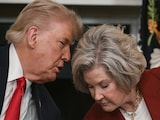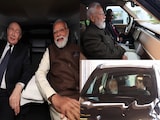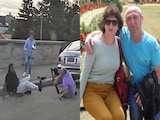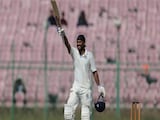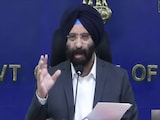File photo: Thai Prime Minister Yingluck Shinawatra
AP photo
Bangkok:
Thai Prime Minister Yingluck Shinawatra said on Monday she would "open every door" to find a peaceful solution to a political crisis gripping Bangkok as police used rubber bullets against protesters seeking to topple her government.
The violence is the latest twist in a conflict pitting Bangkok's middle class and royalist elite against the mostly poor, rural supporters of Yingluck and her brother, Thaksin Shinawatra, a populist former prime minister who was ousted in a military coup in 2006 and lives in self-imposed exile.
Yingluck told a news conference that police would not use force, but the national security chief later said rubber bullets were being used as protesters threatened to advance on Yingluck's office, the focal point of the demonstrations since the weekend.
The number of protesters was well down on the 30,000 dispersed around various sites on Sunday, but hard-core elements had broken through concrete barriers set up around Government House, Yingluck's office in the heart of Bangkok.
After using round upon round of teargas to repel them on Sunday, police stepped up their response on Monday.
"We are alternating between the use of water cannons, teargas and rubber bullets. Rubber bullets are being used in one area only and that is the bridge near Government House," Paradorn Pattanathabutr, the head of the National Security Council, told Reuters.
Teargas was also used against protesters trying to tear down barriers at the Bangkok metropolitan police headquarters.
However, protest organisers told them to pull back in the late afternoon, a Reuters reporter said, at around the same time the protest movement said leader Suthep Thaugsuban would make an announcement at 7:30 p.m. (1230 GMT).
Suthep met Yingluck late on Sunday but insisted there had been no negotiations to end the worst political crisis since bloody unrest in 2010.
He said the meeting was arranged by the military, a powerful institution in Thailand that has taken sides against Thaksin-allied governments in the past and put down a pro-Thaksin movement in 2010, when more than 90 people were killed.
The government at the time - in which Suthep was a deputy prime minister - gave the military powers under an emergency decree to clear pro-Thaksin "red shirts" from central Bangkok.
This time the army has carefully tried not to get involved, only reluctantly providing unarmed back-up for police.
"The military has positioned itself as neutral and it wants to see a peaceful way out," Yingluck told the news conference.
Three people were shot dead at the weekend, including two government supporters who had been at a rally to the east of Bangkok and a student from a nearby university. The remains of a fourth person have been found in a burnt-out bus near there, police said.
Thaksin, who won over poor rural and urban voters with populist policies, was convicted in absentia of graft in 2008 but he dismissed the charges as politically motivated. He is widely seen as the power behind Yingluck's government, sometimes holding meetings with the cabinet by webcam.
The protests have been joined by the opposition Democrat Party, which was trounced by Yingluck's Puea Thai party in a 2011 election. It has lost every election for the past 13 years to Thaksin or his allies.
The baht picked up slightly after Yingluck's comments and the stock market, which had been down more than 1 per cent, ended up 0.2 per cent.
The baht has fallen 3 per cent since early November and the benchmark stock index has lost 5.8 per cent in the past month.
The cost of insuring exposure to Thai government debt via credit default swaps (CDS) has also crept up in recent weeks.
"IMPOSSIBLE DEMANDS"
Suthep, 64, who resigned as a Democrat lawmaker to lead the protests, wants a vaguely defined "people's council" to replace Yingluck's government and a parliament made up of nominated worthies.
"The protesters' demands are impossible to meet under the framework of the constitution," Yingluck told the news conference.
Suthep has set a Tuesday deadline for her to step aside and his movement has called for civil servants to go on strike.
"Government workers are still tools of the Thaksin regime. Today we have to take care of this so that civil servants will stop serving Thaksin. They can do this by stopping work," Akanat Promphan, Suthep's stepson and a spokesman for the Civil Movement for Democracy protest group, said on Monday.
Yingluck said government offices were open as normal and many ministries appeared to be functioning. The Commerce Ministry released inflation data as planned.
Protesters went to state television stations on Sunday and got them to agree to broadcast Suthep's speeches live.
"We did not set out to intimidate the media yesterday but we urged them to broadcast the correct news," Akanat said.
Some big shopping malls in Bangkok closed as a precaution on Sunday but were open on Monday. Several major universities said they would close to ensure the safety of students.
The protesters occupied a government complex and the Finance Ministry last week. Police spokesman Piya Utayo said on Sunday that troops were being sent to retake those buildings but no move has been made yet.
The violence is the latest twist in a conflict pitting Bangkok's middle class and royalist elite against the mostly poor, rural supporters of Yingluck and her brother, Thaksin Shinawatra, a populist former prime minister who was ousted in a military coup in 2006 and lives in self-imposed exile.
Yingluck told a news conference that police would not use force, but the national security chief later said rubber bullets were being used as protesters threatened to advance on Yingluck's office, the focal point of the demonstrations since the weekend.
The number of protesters was well down on the 30,000 dispersed around various sites on Sunday, but hard-core elements had broken through concrete barriers set up around Government House, Yingluck's office in the heart of Bangkok.
After using round upon round of teargas to repel them on Sunday, police stepped up their response on Monday.
"We are alternating between the use of water cannons, teargas and rubber bullets. Rubber bullets are being used in one area only and that is the bridge near Government House," Paradorn Pattanathabutr, the head of the National Security Council, told Reuters.
Teargas was also used against protesters trying to tear down barriers at the Bangkok metropolitan police headquarters.
However, protest organisers told them to pull back in the late afternoon, a Reuters reporter said, at around the same time the protest movement said leader Suthep Thaugsuban would make an announcement at 7:30 p.m. (1230 GMT).
Suthep met Yingluck late on Sunday but insisted there had been no negotiations to end the worst political crisis since bloody unrest in 2010.
He said the meeting was arranged by the military, a powerful institution in Thailand that has taken sides against Thaksin-allied governments in the past and put down a pro-Thaksin movement in 2010, when more than 90 people were killed.
The government at the time - in which Suthep was a deputy prime minister - gave the military powers under an emergency decree to clear pro-Thaksin "red shirts" from central Bangkok.
This time the army has carefully tried not to get involved, only reluctantly providing unarmed back-up for police.
"The military has positioned itself as neutral and it wants to see a peaceful way out," Yingluck told the news conference.
Three people were shot dead at the weekend, including two government supporters who had been at a rally to the east of Bangkok and a student from a nearby university. The remains of a fourth person have been found in a burnt-out bus near there, police said.
Thaksin, who won over poor rural and urban voters with populist policies, was convicted in absentia of graft in 2008 but he dismissed the charges as politically motivated. He is widely seen as the power behind Yingluck's government, sometimes holding meetings with the cabinet by webcam.
The protests have been joined by the opposition Democrat Party, which was trounced by Yingluck's Puea Thai party in a 2011 election. It has lost every election for the past 13 years to Thaksin or his allies.
The baht picked up slightly after Yingluck's comments and the stock market, which had been down more than 1 per cent, ended up 0.2 per cent.
The baht has fallen 3 per cent since early November and the benchmark stock index has lost 5.8 per cent in the past month.
The cost of insuring exposure to Thai government debt via credit default swaps (CDS) has also crept up in recent weeks.
"IMPOSSIBLE DEMANDS"
Suthep, 64, who resigned as a Democrat lawmaker to lead the protests, wants a vaguely defined "people's council" to replace Yingluck's government and a parliament made up of nominated worthies.
"The protesters' demands are impossible to meet under the framework of the constitution," Yingluck told the news conference.
Suthep has set a Tuesday deadline for her to step aside and his movement has called for civil servants to go on strike.
"Government workers are still tools of the Thaksin regime. Today we have to take care of this so that civil servants will stop serving Thaksin. They can do this by stopping work," Akanat Promphan, Suthep's stepson and a spokesman for the Civil Movement for Democracy protest group, said on Monday.
Yingluck said government offices were open as normal and many ministries appeared to be functioning. The Commerce Ministry released inflation data as planned.
Protesters went to state television stations on Sunday and got them to agree to broadcast Suthep's speeches live.
"We did not set out to intimidate the media yesterday but we urged them to broadcast the correct news," Akanat said.
Some big shopping malls in Bangkok closed as a precaution on Sunday but were open on Monday. Several major universities said they would close to ensure the safety of students.
The protesters occupied a government complex and the Finance Ministry last week. Police spokesman Piya Utayo said on Sunday that troops were being sent to retake those buildings but no move has been made yet.
© Thomson Reuters 2013


